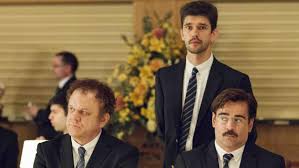MOMMIES DEAREST: Movie Reviews of films Mia Madre and The Light Between Oceans by Howard Casner
Posted: September 11, 2016 | Author: Donald | Filed under: Uncategorized | Tags: Alicia Vikander, Blue Valentine, Bryan Brown, Derek Cianfrance, Francesco Piccolo, John Turturro, Margherita Buy, Mia Madre, Michael Fassbender, Nanni Moretti, Rachel Weisz, The Light Between Oceans, The Place Beyond the Pines, Valia Santelli, We Have a Pope, Wim Wenders, Wings of Desire | 845 Comments »For questions: hcasner@aol.com
First, a word from our sponsors: I am now offering a new service: so much emphasis has been given lately to the importance of the opening of your screenplay, I now offer coverage for the first twenty pages at the cost of $20.00. For those who don’t want to have full coverage on their screenplay at this time, but want to know how well their script is working with the opening pages, this is perfect for you. I’ll help you not lose the reader on page one.
Ever wonder what a reader for a contest or agency thinks when he reads your screenplay? Check out my new e-book published on Amazon: Rantings and Ravings of a Screenplay Reader, including my series of essays, What I Learned Reading for Contests This Year, and my film reviews of 2013. Only $2.99. http://ow.ly/xN31r
and check out my Script Consultation Services: http://ow.ly/HPxKE
Warning: SPOILERS
 In many ways, Margherita is having a year of Job.
In many ways, Margherita is having a year of Job.
Her mother is dying and she and her brother spend much of their time with their parent in the hospital. She’s directing a socially conscience film that is not going well; it seems fake and she’s not sure she can make the project work, and small things keep going wrong. She has recently broken up with her latest lover because she can’t leave her work at home. She is having trouble relating to her daughter. And she is having difficulty getting a performance from the American actor flown in for the lead of the film (he has a condition that makes it difficult for him to remember lines, made worse in that they are in Italian).
The film, Mia Madre, is co-written by the director Nanni Moretti (along with Valia Santelli and Francesco Piccolo) and is inspired by the time in his life when his mother was dying while he was filming We Have a Pope. Read the rest of this entry »
THE GOOD, THE NOT SO BAD AND THE UGLY: AFI 2015, PART 3: NO RESERVATIONS-Movie Reviews of the movies The Lobster and Youth by Howard Casner
Posted: December 2, 2015 | Author: Donald | Filed under: Uncategorized | Tags: Ben Whishaw, Collin Farrell, Efthymis Filippou, Garry Moutaine, Harvey Keitel, Jane Fonda, John C. Reilly, Lea Seydoux, Michael Caine, Olivia Coleman, Paola Sorrentino, Paul Dano, Rachel Weisz, The Lobster, Yorgos Lanthimos, Youth | 782 Comments »First, a word from our sponsors: I am now offering a new service: so much emphasis has been given lately to the importance of the opening of your screenplay, I now offer coverage for the first twenty pages at the cost of $20.00. For those who don’t want to have full coverage on their screenplay at this time, but want to know how well their script is working with the opening pages, this is perfect for you. I’ll help you not lose the reader on page one.
Ever wonder what a reader for a contest or agency thinks when he reads your screenplay? Check out my new e-book published on Amazon: Rantings and Ravings of a Screenplay Reader, including my series of essays, What I Learned Reading for Contests This Year, and my film reviews of 2013. Only $2.99. http://ow.ly/xN31r
and check out my Script Consultation Services: http://ow.ly/HPxKE
Warning: SPOILERS
 Two movies at AFI were brought there by filmmakers who worked with an English speaking cast for the first time. Screenwriter Efthymis Filippou and writer/director Yorgos Lanthimos, from Greece, previously gave the world the oddity Dogtooth and, appropriately enough, now give us the quite possibly even odder oddity, The Lobster.
Two movies at AFI were brought there by filmmakers who worked with an English speaking cast for the first time. Screenwriter Efthymis Filippou and writer/director Yorgos Lanthimos, from Greece, previously gave the world the oddity Dogtooth and, appropriately enough, now give us the quite possibly even odder oddity, The Lobster.
The Italian filmmaker Paola Sorrentino, who directed and co-wrote the absolutely brilliant and ravishing The Great Beauty, has now given us Youth.
Overall, they have all succeeded rather well in spite of the fact that they are creating in a language that is not their native tongue.
Efthymis Filippou and Yorgos Lanthimos’ The Lobster is set in one of those dystopian futures and is located in The City, a place where everyone must be in a relationship, and if you are not (say you are widowed), you go to a hotel with others like yourself and are given 45 days to fall in love. If, at the end of your stay, you find yourself yet single, you are turned into the animal of your choice. Read the rest of this entry »
Movie Review of Oz The Great and Powerful and The Monk by Howard Casner
Posted: March 13, 2013 | Author: Donald | Filed under: Uncategorized | Tags: Anne-Louise Trividic, David Lindsay-Abaire, Dominik Moll, James Franco, Michelle Williams, Mila Kunis, Mitchell Kapner, Oz The Great and Powerful, Rachel Weisz, Sam Raimi, Sergi Lopez, The Monk, Vincent Cassel, Zach Braf | 3 Comments »Oz The Great and Powerful, the new fantasy film written by Mitchell Kapner and David Lindsay-Abaire and directed, for some reason, by Sam Raimi, is a movie about a man with Peter Pan syndrome and has commitment issues who ends up in a land far, far away where he gets caught up in a cat fight between three woman (Michelle Williams, Mila Kunis and Rachel Weisz) who are jealous of each other’s looks and/or the man in their lives. Yes, that’s about as much imagination as is shown in this conglomeration culled from the characters in the books of Frank L. Baum (of The Wizard of Oz fame).
It’s also a movie starring the incredibly, if not profoundly, miscast James Franco (easily as miscast as he was as host of the Oscars) in the titular role. It’s a movie in which every scene is designed for maximum 3-D effect, while the scenery, characters and dialog are as flat as Franco’s acting (and with backgrounds that have rarely looked as much like matte drawings as they do here). It’s a movie in which Zach Braf, a former romantic lead of such outings as Scrubs, Garden State and The Last Kiss, has fallen to such depths as to be cast in a second lead, as a flying monkey no less, yet he still steals every single scene he is in.
And finally, it’s a movie that can’t have a satisfactory ending because the filmmakers have painted themselves into a corner. The only truly dramatically satisfactory resolution is for Oz to return to Kansas to save former girlfriend Annie (Michelle Williams) from a loveless marriage. But he can’t leave Oz because he’s got to be there when Dorothy arrives. But his character arc needs to be resolved, so he ends up kissing Glinda (also played by Michelle Williams, and I suppose that from the filmmakers’ points of view, one woman is the same as another, so it really doesn’t matter if Oz ends up with Annie or Glinda as long as they are played by the same actress), but we know that this relationship can’t last because there’s no such relationship when D-girl arrives. And isn’t there something just a little creepy in that a lead character in a family film is awarded with sex for saving the day?
Oz The Great and Powerful doesn’t work. It’s unimaginative in design, acting, direction and writing. Perhaps it’s best to say that it’s a movie that is no Jack the Giant Slayer and let it go at that.
Meanwhile, The Monk is also about a character that is also supposed to be charismatic and inspiring. It’s the new movie written by Dominik Moll (who also directed) and Anne-Louise Trividic. Moll also directed the highly recommended films With a Friend Like Harry… and Lemming and there seems to be a theme here—that of some evil or perverseness worming its way into a seemingly safe situation.
The Monk is about, well, this monk Ambrosio who lived in Spain in the late 18th century. He’s very popular. His sermons draw SRO crowds. I have to be honest, I wasn’t exactly sure why. His homilies are pretty doom and gloomy stuff and the character, as played by Vincent Cassel, is not the most charismatic of preachers. He’s actually much better at confession where he’s able to cut through bullshit with a butter knife.
Ambrosio’s main philosophical point is that Satan has no more power over any of us than we can stand. I guess that was too much of a Job like statement, because it’s not long before Satan (played by Sergi Lopez, one of the go to guys for playing the devil these days, I guess) arrives to take up the gauntlet the monk has thrown him (Lopez is actually in the opening scene, which in many ways kind of demonstrates one of the structural weaknesses of the story—since the audience doesn’t know this is Satan, it never gets related to the rest of the story until the movie’s over, which isn’t very satisfactory). But at any rate, Satan sends evil to the monastery and since this is based on a Catholic novel written in 1796, evil must arrive in the form of a woman. And Ambrosio’s beliefs are quickly proved wrong because Satan’s power is greater than the father can withstand and Ambrosio is soon heading toward an Oedipal like tragic ending.
But the movie never quite worked for me mainly because Satan is able to defeat Ambrosio by using magical powers and forcing Ambrosio to do things he would never normally do. Satan’s not the devil here, he’s a Jedi knight. So instead of being emotionally involved in Ambrosio’s downfall, all I could think was, “Hey, that’s cheating”. I guess the whole thing’s suppose to be some sort of metaphor, but if so, it all felt a bit too vague to me until I didn’t know what the moral of the story was supposed to be: beware of Satan because he’s really Yoda?
The real problem with the movie, though, may be the basic structure. It’s a tad all over the place. There are three major through lines and the movie takes a bit too long in bringing them all together (and one never seems satisfactorily integrated). And the movie also tries to implicate the monk for the fate of a young nun, something to which Ambrosio’s guilt is tenuous at best and to which I called “shenanigans”.
I understand that the great prankster filmmaker Louis Bunuel wanted to make a movie of the novel over the years and one can see why. It has all the ingredients that would appeal to someone with the impious sensibility of that anti-Catholic filmmaker. And he quite possibly would have been able to bring a certain perverse vision to the material that might have been more successful. But for me, this movie is just a slight misstep in Moll’s career.











